|
|
|
Sort Order |
|
|
|
Items / Page
|
|
|
|
|
|
|
| Srl | Item |
| 1 |
ID:
108317
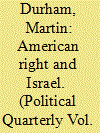

|
|
|
|
|
| Publication |
2011.
|
| Summary/Abstract |
In recent years there has been considerable controversy over the relationship between the United States and Israel. Neoconservatives and Christian Zionists have been vociferous in support of the relationship, while John Mearsheimer and other critics have questioned what America gains from such an alliance. While the G. W. Bush administration has often been portrayed as uncritically favouring Israel, it was the subject of criticism on the issue from within the American Right. Now it is the Obama administration which is drawing fire for its stance on Israel.
|
|
|
|
|
|
|
|
|
|
|
|
|
|
|
|
| 2 |
ID:
108311
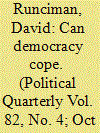

|
|
|
|
|
| Publication |
2011.
|
| Summary/Abstract |
The success story of democracy over the twentieth century has given way to doubts in the twenty-first, as democracies struggle to cope with difficult wars, mounting debts, climate change and the rise of China. This essay uses intellectual history to explain the link between long-term democratic success and short-term democratic failure. It distinguishes three distinct views of what can go wrong with democracy, and identifies the third (which I call 'the confidence trap', an idea that originates with Tocqueville) as the key to understanding our present predicament. Democratic success creates blind spots and a reluctance to tackle long-term problems. I use this idea to explain and put in context Fukuyama's claims about the end of history, and to examine the link between democratic failure and market failure.
|
|
|
|
|
|
|
|
|
|
|
|
|
|
|
|
| 3 |
ID:
108318


|
|
|
|
|
| Publication |
2011.
|
| Summary/Abstract |
This article discusses whether global politics are the best means for achieving cosmopolitan ends. It distinguishes the cosmopolitan goal of global obligations from the cosmopolitan politics of global governance. Evidence for cosmopolitanism in society and culture is not strong. In global politics states pursue their own material interests rather than cosmopolitan goals. Copenhagen and the financial crisis did not lead to global cosmopolitan politics as might have been hoped. The article argues that it is dangerous to continue to believe in cosmopolitan politics in such a context. Cosmopolitanism is better pursued through a politics that recognises material interests, conflict, is bottom-up and based in what is happening, rather than top-down and optimistic about cosmopolitan attitudes.
|
|
|
|
|
|
|
|
|
|
|
|
|
|
|
|
| 4 |
ID:
108319
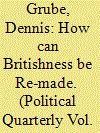

|
|
|
|
|
| Publication |
2011.
|
| Summary/Abstract |
Modern Britishness is widely seen to be based on shared values like 'fair play', 'tolerance', and respect for 'diversity'. Can such a 'values-based Britishness' be effective as a national binding agent in an era of devolution and globalisation? The idea that a uniquely 'British' character is based on shared values of some kind is not new. The contemporary debate is framed by decisions made over a century ago in the Victorian era-when the decisive shift occurred from a British identity based on religious difference to one based on shared moral values. Through political rhetoric, legislation, and the courts, Victorian governments shaped and changed the character of Britishness. The same tools remain available to contemporary lawmakers in shaping a twenty-first century Britishness that embraces modern universal values, but also defines some more uniquely British emotional connection points around which national identity can be built.
|
|
|
|
|
|
|
|
|
|
|
|
|
|
|
|
| 5 |
ID:
108315
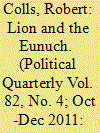

|
|
|
|
|
| Publication |
2011.
|
| Summary/Abstract |
The Lion and the Eunuch challenges the failures of British politicians to adequately understand the complexities, and the subtleties, of British national identity, and goes on to define it for them. It also explains reasons for our current confusions over who we are in the world. In 1940 Orwell wrote The Lion and the Unicorn as a rallying cry for a richly identifying country that was still able to imagine itself, and re-imagine itself, as the need arose. This essay suggests that without a radical change of government policy and thought, that power will continue to decline with far reaching consequences for the peoples of these islands.
|
|
|
|
|
|
|
|
|
|
|
|
|
|
|
|
| 6 |
ID:
108312


|
|
|
| 7 |
ID:
108316


|
|
|
|
|
| Publication |
2011.
|
| Summary/Abstract |
This article examines Ireland's financial crisis. Thus far explanation has focused on individual or collective administrative failure: the office(r) of financial regulation singularly failed to scrutinise the banks sufficiently: it was a matter of poor risk management. While this article would agree that the (mis)management of risk was important to how the crisis unfolded, I argue that an explanation of why the crisis emerged demands an altogether different focus. Put simply, after financial regulatory reform, a reconfiguration of risk in politics took place as the locus of decision-making about financial risk shifted from the realm of the political/legal (Cabinet/Central Bank/Department of Finance) to the economic/legal (retail banks, shareholders/consumers). It was a critical development, one that mirrored events taking place in the UK, upon which Ireland drew experience, for now assessments about risk undertaken by the banks demanded that intervention could be justified only on an ascertainable risk, not a theoretical uncertainty (or spurious fear). The evidentiary bar for intervention was therefore raised, removing the precautionary instinct implicit in the prudential governance of Central Banks.
|
|
|
|
|
|
|
|
|
|
|
|
|
|
|
|
| 8 |
ID:
108320


|
|
|
|
|
| Publication |
2011.
|
| Summary/Abstract |
Despite secularisation and increased religious diversity the UK state and the monarchy are religiously legitimated institutions which have their origins in protestant/catholic divisions over three hundred years ago but which remain strong enough to survive in the current era. The Church of England acts not only as the established church of England but as a church for the UK with respect to events such as the coronation and the royal wedding of 2011. Ecumenical and interfaith initiatives have been attempted by the government and the monarchy and were evident in attendance at the wedding but it demonstrated the ritual supremacy of the state church and the inevitable difficulties of seeking to achieve formal representation for religious diversity in the state. Attempts at more formally inclusive religious involvement in state institutions conflict with other goals such as gender equity and suggest that secular state institutions might be fairer to all religions, denominations and those with no beliefs.
|
|
|
|
|
|
|
|
|
|
|
|
|
|
|
|
| 9 |
ID:
108314
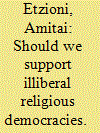

|
|
|
|
|
| Publication |
2011.
|
| Summary/Abstract |
The terms on which the US will agree to settle the conflict in Afghanistan reflect a much greater issue that the US faces in the Middle East: will it support only those who seek to establish democratic regimes that also respect individual, or ally itself with the often much more powerful groups that may be democratic, but are likely to foster regimes based on Shari'a law? At the very least, the West should urge all to respect the right to life, call on regimes to negotiate with protesters rather than machine-gunning them, and insist that protesters follow the Egyptian and Tunisian model of peaceful uprising. Beyond such liberal basics, it is best to let each nation work out its own regime. As a matter of policy, in order to support democratic groups and evolving democratic regimes in the Middle East, western governments had best be prepared to ally themselves with political forces whose liberal credentials, one must recognise, are evolving but not yet particularly high.
|
|
|
|
|
|
|
|
|
|
|
|
|
|
|
|
| 10 |
ID:
108313
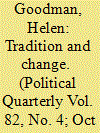

|
|
|
|
|
| Publication |
2011.
|
| Summary/Abstract |
Helen Goodman, the Member of Parliament for Bishop Auckland has responded to the Blue Labour Publication The Politics of Paradox, with Tradition and Change: Four People. Blue Labour's thesis is that a return to the ideas and practices prevalent at the foundation of the Labour Party-solidarity and reciprocity, can form the basis of significant social change. Helen views the thesis from the perspective of two communities-first the hill farmers of Teesdale, a paradigmatic community whose rights and way of life on the Commons have existed for over 600 years. Then she looks at the Durham Miners' Gala and the needs of the former coalfields. Helen argues that in both cases, only government can take the national and international action they need. Secondly she looks at the stories of a mother and a priest. The importance of the welfare state in providing security and opportunities becomes clear. Helen confronts Blue Labour's criticism of women's independence and prays in aid the Archbishop of Canterbury on the need for a feminist analysis. She accuses Blue Labour of 'drum and trumpet jingoism'.
|
|
|
|
|
|
|
|
|
|
|
|
|
|
|
|
|
|
|
|
|